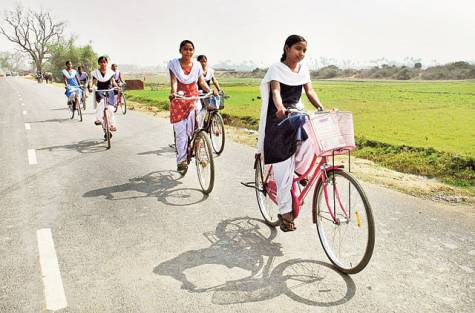
Rampur Singhara, May 22: The daily trip to high school was expensive, long and eventually, too much for Indian teenager Nahid Farzana, who decided she was going to drop out. Then, the state government gave her a bicycle.
Two years later, she is about to graduate from high school and wants to be a teacher.
The eastern state of Bihar has been so successful at keeping teenage girls in school, the bike giveaways have spread to neighbouring states. Now the Indian government wants to expand it across the country in hopes it might help improve female literacy.
Before starting the programme in 2007, officials in Bihar, one of India's poorest and least developed states, despaired over how to educate the state's females, whose literacy rate of 53 per cent is more than 20 points below that of its males.
Dropout rate
"We found that the high school dropout rate soared when girls reached the ninth grade. This was primarily because there are fewer high schools and girls had to travel longer distances to get to school," said Anjani Kumar Singh, Bihar's principal secretary overseeing education.
Poor families could not spare the money for transport, or were reluctant to let girls travel so far away, fearing for their safety.
The programme was an instant success, with the number of girls registered in the ninth grade in Bihar's state schools more than tripling in four years, from 175,000 to 600,000.
"The results are remarkable. The school dropout rate for girls has plunged," says Singh.
In her crisply starched blue tunic uniform and white scarf, Farzana appears a carefree teenager, proud to have made it into the tenth grade. But she almost did not make it.
Her daily bus fare of 15 rupees (Dh0.99) to the new high school 6 kilometers from their home in Rampur Singhara village was an additional burden her father, a car mechanic, could not afford.
"I wouldn't have been able to keep Farzana in school for long," said Mohammad Shiraz Ahmad, her father.
A teacher told them about the free bicycles, and Farzana applied for the 2,500 rupee (Dh165) grant to buy the bike.
"The bicycle has changed everything," Ahmad said.
In remote villages, gaggles of school girls can be seen jauntily cycling to school.






Comments
Add new comment